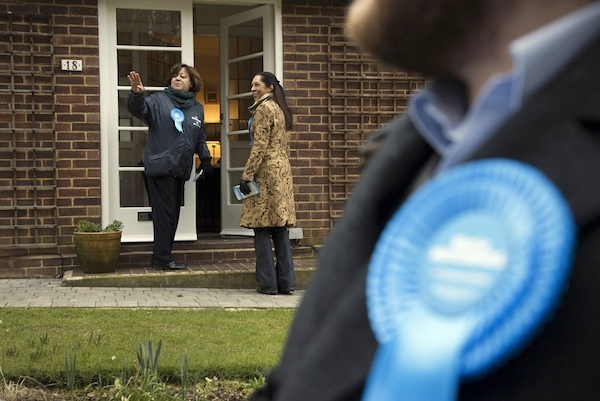At 9.15pm, with 45 minutes until polls closed in the Eastleigh by-election, the ‘get out the vote’ telephone operation at Conservative Central Headquarters stopped. As one fellow volunteer put it, it was so late in the day that we were just ‘pissing people off’. Having been there all day, I’d had that feeling for several hours, as voter after voter spoke of the harassment they had received during the Eastleigh campaign from all of the major parties. By the early evening we were calling people who not only had received several calls already that day to remind them to vote, as well as one or two visits to their doorstep, but these poor voters had sent in their ballots by post, and had told everyone that. One of the practical reasons the Conservatives lost was a lack of data: banks of volunteers young and old spent hours on the phone and walking the streets pestering postal voters who’d already sent off their votes and we’d failed to record this fact. We called quite a few dead people.
Much is already being written about the influence of UKIP on this election. I spoke to dozens of people who voted for UKIP wilfully aware that by not voting Conservative they would be making a Liberal Democrat win more likely: many of them didn’t care about splitting the vote on the right, because they wanted to send a message. Daniel Hannan’s astute point that ironically the rise of UKIP may be the thing which denies the public a referendum on Europe after 2015 wouldn’t have troubled these voters: they were voting for UKIP in protest. Astonishingly some of them even admitted to me that they knew it was ‘the wrong thing to do’ but expressed anger at cuts in the welfare their children were receiving, and the slow pace of reform.
Despite being in favour of the change myself, there can be no denying that in a place like Eastleigh gay marriage hurt the Conservative vote. In the immediate aftermath of the vote, with so many still stunned by this undeniable social change, UKIP may have been the beneficiaries of opposing gay marriage. People spoke of the shock in their local communities at this change, a shock that the Conservatives must now hope subsides with time.
We were not as bad as the Liberal Democrats for bombarding the voters of Eastleigh with flyers, voters told me. In electioneering there is no perfect number of flyers you can put through the letterbox: for 30 years the Conservatives sent nothing, one caller told me, and now there was a deluge of material. Neither was what she would have wanted. More than one person complained that they started to receive leaflets on polling day at 6am. Voters – it would seem – always feel either deluged or ignored. One voter followed up this complaint at the sea of paper coming through his door by saying that he’d have voted for Maria Hutchings instead of UKIP if he’d known that she was against gay marriage, despite her opposition being one of the most famous things about her candidacy. We may not have been as bad at harassing the voters with leaflets as the Liberal Democrats, but then they won the seat. The local data required to win elections takes years of work by active grassroots supporters.
There will be a huge collective sigh of relief in Eastleigh: people can go back to picking up their phones, and they won’t need snow ploughs to clear the carpet beneath their front doors. No constituency will received the resources come the general election that the voters were subjected to in Eastleigh, a fact which will doubtless dilute UKIP’s ability to perform as strongly. I have never seen an election in which the voters were so saturated with information: usually you get more than the odd household where they don’t even know that it’s taking place.
Whilst the writers of Westminster decide what this all means for 2015, we would do well to remember that by-elections are unusual creatures, and that people use them to send different messages from the ones they send at general elections. For the voters of Eastleigh, as one harangued man put it to me at about 8pm, it’s all over.






Comments